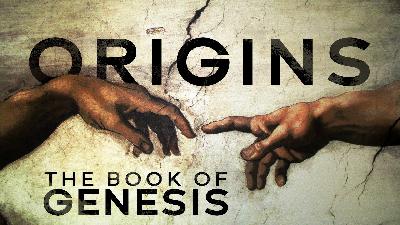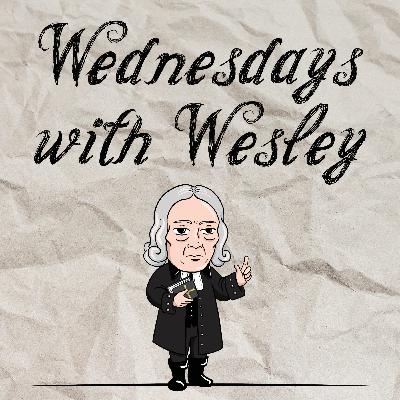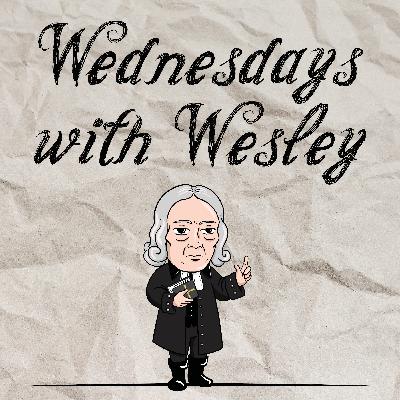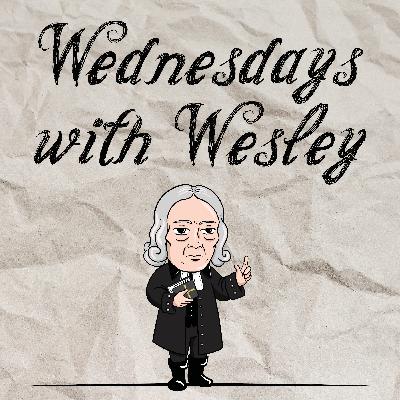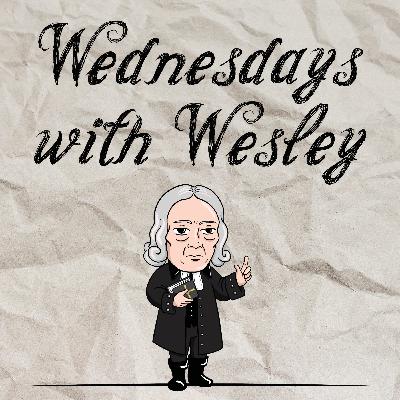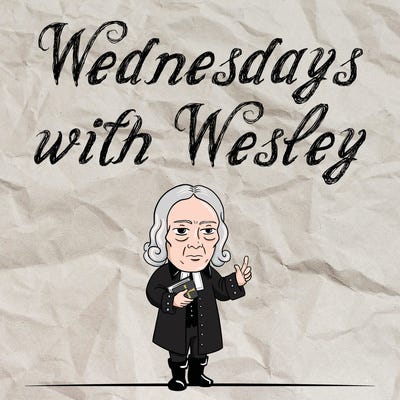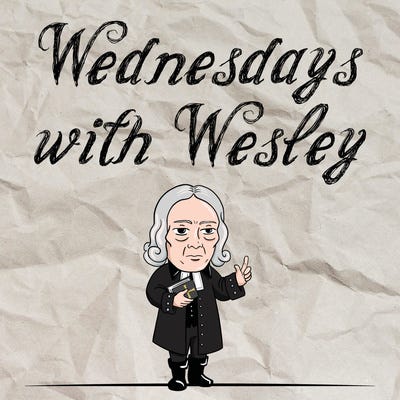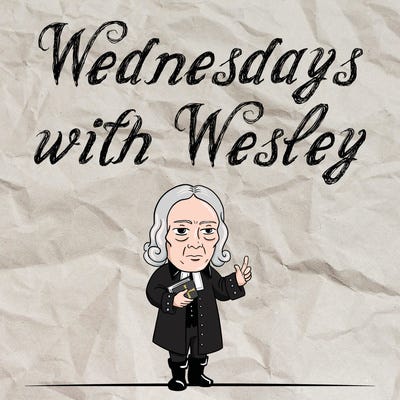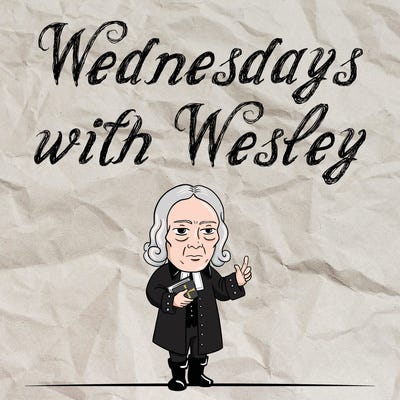Discover Wednesdays with Wesley
Wednesdays with Wesley

Wednesdays with Wesley
Author: Bob Kaylor
Subscribed: 8Played: 483Subscribe
Share
© Aldersgate Church
Description
Every other Wednesday, host Bob Kaylor and guests take a deep dive into the sermons and writings of John Wesley, the founder of the Methodist movement. This is great introduction to Wesley's sermons and writings for clergy and laity in the Methodist tribe as well as for those who are interested in learning more about this grace-filled and "methodical" theological tradition.
Dr. Bob Kaylor is Lead Pastor at Aldersgate Church in York, PA
bobkaylor.substack.com
Dr. Bob Kaylor is Lead Pastor at Aldersgate Church in York, PA
bobkaylor.substack.com
58 Episodes
Reverse
I’m really excited to bring you this new series of sermons on the Book of Genesis beginning January 5. The Book of Genesis is foundational to understanding the Bible, understanding who we are, and understanding who God is. We’ll be diving into the text each Sunday through Lent, but there’s so much to explore that it will be hard to confine it to the length of a weekly sermon. To supplement that teaching, I’m going to put together some additional teaching videos to fill in some of the gaps and add to your knowledge base. This first one looks at the basic question of who wrote Genesis and when. This week’s sermon (January 5, 2025)We celebrate Epiphany Sunday this week, which marks the visit of the Magi bearing gifts for the child Jesus, but we're also beginning a new sermon series titled "Origins: The Book of Genesis." What do Epiphany and the opening verses of Genesis have to do with one another? Well, the word "epiphany" means a "a manifestation of divinity," or a revelation of the divine, while "genesis" means "beginning." In effect, these two stories both reveal the character and nature of God as the one who comes to dwell with his people in his good creation. As the brightness of a star illuminated the way for the Magi, revealing to these Gentiles the true character of God in Israel's Messiah, so the opening verses of Genesis illumine the way to understanding God and God's purpose for his people and his creation. In this first sermon, we’ll explore how the opening verse of Genesis is the key to understanding not only the Book of Genesis, but to knowing God and knowing who we are in in relationship to him.See you Sunday at Aldersgate Church! This is a public episode. If you would like to discuss this with other subscribers or get access to bonus episodes, visit bobkaylor.substack.com
“Always let your conscience be your guide.” That’s the advice that Jiminy Cricket gives to Pinocchio in the little ditty he sings in the Disney movie. It’s advice that seems to ring true for a lot of people in a western culture where individual autonomy is the highest value. In that worldview, “conscience” is a construct of one’s own thoughts and opinions--how you feel about right and wrong is what matters. Another’s conscience about a particular moral choice might be different but, all things being equal, it’s your conscience so “you do you” as the kids say.Such a worldview assumes that there’s no such thing as a universal standard of right and wrong. Christians, however, don’t subscribe to that worldview. We believe that God has established a way to live for the human beings he created in his image--a way that is embedded in us if we will acknowledge it. The very idea that there is such a thing as right and wrong is evidence of the image of God stamped on every human being. We Wesleyans would say its further evidence of God’s “prevenient grace”--that grace that goes before our understanding of God. When we become Christians, however, we see our conscience tuned and honed in a way that not only keeps us in the way God has made for us, the way of Christ, but also enables us to live joyful and abundant lives, assured that we are children of God.The Christian conscience is the focus on John Wesley’s 1746 Sermon, “The Witness of Our Own Spirit,” and that’s our focus in this episode of Wednesdays with Wesley.Read The Witness of Our Own SpiritAdd your questions and comments below and please leave a review on your favorite podcast platform. Wednesdays with Wesley is a free resource designed to reconnect the Wesleyan world to our theological roots. This is a public episode. If you would like to discuss this with other subscribers or get access to bonus episodes, visit bobkaylor.substack.com
Doctrines, experiences to try,We to the sacred standard fly.Assured the Spirit of our LordCan never contradict his Word.What e’re his Spirit speaks in meMust with the written word agree;If not: I cast it all asideAs Satan’s voice, or nature’s pride.This verse from a Charles Wesley hymn (973 in Volume 1 of Short Hymns) speaks to the witness of the Holy Spirit and the witness of Scripture and the way they are dependent upon each other. The Scriptures reveal the Word of God inspired by the Spirit of God, and yet the Spirit also enables us to interpret Scripture according to that Word. The Spirit and the Word do not contradict one another, and that’s especially true when it comes to the doctrine of assurance, which we’re continuing to explore in this episode of Wednesdays with Wesley.Sermon X, The Witness of the Spirit, is actually part 1 of a two-part discourse in which John Wesley will expound on the ways in which we can discern the assuring word of the Spirit of God versus our own inner voice or, more insidiously, against the voice of Satan. That sort of discernment is vital, especially in an age where plenty of people are claiming that they are hearing “new things” from the Spirit of God that diverge from what God has revealed in the Scriptures.Read The Witness of the SpiritSend your questions and comments to the host, Bob Kaylor, at revbkaylor@gmail.com. This is a public episode. If you would like to discuss this with other subscribers or get access to bonus episodes, visit bobkaylor.substack.com
How can we know that we are children of God? In this episode, host Bob Kaylor looks at a sermon that lays the groundwork for the Wesleyan doctrine of assurance. It’s an essential component of the larger understanding of how those in the Wesleyan tribe understand sanctification and also gives us reason to embrace John Wesley’s optimism that the gospel of Jesus Christ actually works! Read The First Fruits of the SpiritRead Carolyn Moore’s blog post on “What Wesleyans believe about ‘once saved, always saved.”Leave us a review on your favorite podcast platform and let others know about Wednesdays with Wesley! This is a public episode. If you would like to discuss this with other subscribers or get access to bonus episodes, visit bobkaylor.substack.com
The podcast returns with an episode on Wesley’s understanding of the nature of the Church and what constitutes a body that is “faithful in Christ Jesus.” It’s a timely sermon to explore as churches across the Methodist tribe consider their identities after a difficult season. Read Sermon 74 - “Of the Church” Read Howard Snyder’s article “Wesley’s Concept of the Church”Leave us a review on your favorite podcast platform and spread the word about Wednesdays with Wesley! This is a public episode. If you would like to discuss this with other subscribers or get access to bonus episodes, visit bobkaylor.substack.com
Host Bob Kaylor offers a brief update on the show and his impending move into a new season of ministry. Wednesdays with Wesley will be back in a few weeks but, in the interim, send your suggestions for future episodes to revbkaylor@gmail.com (note the new address). Watch for new episodes coming soon! This is a public episode. If you would like to discuss this with other subscribers or get access to bonus episodes, visit bobkaylor.substack.com
In this episode we go a little deeper into John Wesley's understanding of the good news by looking at his definition of "true religion" found in Jesus' proclamation of the kingdom of God. It's a religion of the heart that is evidenced in the believer's life in "righteousness, peace, and joy in the Holy Ghost." As Wesley puts it, "This is the way; walk ye in it!" Host Bob Kaylor walks us through this important sermon that gets at the essence of the gospel and how it's lived out in the lives of those who will "repent and believe the good news." Read The Way of the KingdomLeave us a review on your favorite podcast platform and email the host with your questions and comments at pastorbk@tlumc.org. Follow Bob on Twitter @revbkaylor. This is a public episode. If you would like to discuss this with other subscribers or get access to bonus episodes, visit bobkaylor.substack.com
Many evangelical Christians are aware of The Four Spiritual Laws as a shorthand version of the gospel used in evangelism. While millions of Christians have come to faith through this simple presentation, which has its roots in the Reformed tradition, those in the Methodist tribe might wonder if there is a Wesleyan version of The Four Spiritual Laws that expresses not only the salvation we have in Christ but also a version of the "wonderful plan" for our lives that involves sanctification, restoration in the image of God, and power over sin. Host Bob Kaylor believes he may have found it in John Wesley's letter to Ebenezer Blackwell on December 20, 1751. Near the end of the letter, Wesley outlines in four statements the gospel that the early Methodist preached and believed:1. God loves you: therefore love and obey him.2. Christ died for you: therefore die to sin.3. Christ has risen: therefore rise in the image of God.4. Christ lives evermore: therefore live to God till you live with Him in glory. "This is the scriptural way, the Methodist way, the true way," said Wesley. "God grant that we may never turn therefrom, to the right hand or to the left." What would it mean for 21st century Methodists to adopt this as our "Four Spiritual Laws" for evangelizing the world? Send your questions and comments to Bob Kaylor at pastorbk@tlumc.org and follow Bob on Twitter @revbkaylor. This is a public episode. If you would like to discuss this with other subscribers or get access to bonus episodes, visit bobkaylor.substack.com
The spontaneous revival at Asbury University has now moved into its second week. What started as a regular Wednesday chapel service has grown into a move of God that is attracting hundreds of people to Wilmore, KY, to experience this outpouring of God’s Spirit. People are coming to experience the power of confession and repentance, healing and reconciliation, testimony and spontaneous praise. There’s no central leader, no direction or agenda, just people gathering together, drawn in and sent out by the Spirit in a way that is so unusual that national news outlets are picking it up.But while many are rejoicing at this movement of God that began with college students and is spreading to other campuses, others are skeptical and even critical--and, not surprisingly, a lot of that criticism seems to be coming from those who are actually in the church. Some merely chalk up the revival to emotionalism, while others sniff that it’s not immediately following their prescribed social justice agenda. Still others have never been part of such a spontaneous outpouring and question any kind of ecstatic experience. In Wesley's day, movements of the God outside the established church were considered to be a dangerous form of "enthusiasm," or an irrational religious madness. The reality is, however, that these kinds of revivals and spiritual watershed events are a hallmark of the Wesleyan holiness tradition. Asbury experienced a similar revival back in 1970 that launched a generation of pastors and missionaries. Camp meetings and other gatherings were, and in many places still are, opportunities for the Spirit to bring renewed vision in the midst of prayer, worship, healing, and testimony. Indeed, from the very beginning, Methodism has been a movement of the Holy Spirit and a movement that has always raised questions for those in the institutional church. In "The Nature of Enthusiasm," written in 1750, John Wesley responds to critics of the movement by redefining what "enthusiasm" actually means and offers a prescription for discerning the work of the Holy Spirit and the will of God. It's a timely sermon for this moment in history and one that both supporters and critics of revival need to consider. Read The Nature of EnthusiasmRead Kevin Watson's helpful summarySend your questions and comments to host Bob Kaylor at pastorbk@tlumc.org and follow him on Twitter @revbkaylor. This is a public episode. If you would like to discuss this with other subscribers or get access to bonus episodes, visit bobkaylor.substack.com
In Discourse I, John Wesley described the way in which people (and especially preachers) void the moral law of God by an overemphasis on faith alone. In Discourse II, he offers three ways to properly establish the law through faith: through preaching a fully biblical doctrine, through seeing faith as a means toward holiness, and through living out that law of love in our hearts and lives. The Wesleyan way sees faith and law working together to produce Christ-like character expressed in holy love of God and neighbor. Read The Law Established Through Faith, Discourse IIRead Dr. Kevin Watson's helpful summarySend your questions and comments to host Bob Kaylor at pastorbk@tlumc.org and follow Bob on Twitter @revbkaylor. Leave us a review on your favorite podcast platform! This is a public episode. If you would like to discuss this with other subscribers or get access to bonus episodes, visit bobkaylor.substack.com
“Consider this well--that to preach Christ is to preach all things that Christ hath spoken; all his promises; all his threatenings and commands; all that is written in his book; and then you will know how to preach Christ, without making void the law.” Bringing law and grace, law and faith, into balance is one of the strengths of Wesleyan theology, paying attention to the critical role that both play in the Bible and in the life of the disciple of Jesus. Law without grace is legalism, while grace without law is antinomianism. In this first of two Discourses, John Wesley explores the ways that Christians tend to "void" the law by faith, rather than seeing obedience to the moral law as an essential outcome of faith and the path to holiness. Host Bob Kaylor takes a deep dive into this sermon and explains why it's an essential teaching for Christians in a culture of expressive individualism. Read The Law Established Through Faith, Discourse IRead Kevin Watson's helpful outline and summarySend your questions and comments to pastorbk@tlumc.org and follow Bob on Twitter @revbkaylor. Please take a few minutes to write a review on your favorite podcast platform! This is a public episode. If you would like to discuss this with other subscribers or get access to bonus episodes, visit bobkaylor.substack.com
"The devices whereby the subtle 'god of this world' labors to destroy the children of God, or at least torment whom he cannot destroy, to perplex and hinder them in running the race which is set before them, are numberless as the stars of heaven or the sand upon the seashore." In this sermon, John Wesley looks at some of the particular devices of Satan that would hinder Christians from "going on to perfection." It's a helpful reminder that when it comes to the spiritual life we should focus more on what God has given us than on what we still lack. Read Satan's DevicesSend your questions and comments to host Bob Kaylor at pastorbk@tlumc.org. Follow Bob on Twitter @revbkaylor. This is a public episode. If you would like to discuss this with other subscribers or get access to bonus episodes, visit bobkaylor.substack.com
John Wesley's understanding of prevenient grace allowed him to acknowledge the good that God can accomplish through a variety of people, even those outside of the church. In this sermon he cautions against the kind of spiritual pride that would limit the power of God to only working within our own tribe or even our own religion. When sinners turn to God in repentance, no matter how or through whom it happens, it's something to be celebrated. Host Bob Kaylor takes a look at this important sermon which speaks to the ways that contemporary Christians, and especially Methodists in the midst of deep disagreements, ought to acknowledge God's power working through others in ways we might not expect. Read A Caution Against BigotryRead Kevin Watson's helpful summaryEmail your questions and comments to pastorbk@tlumc.org and follow Bob Kaylor on Twitter @revbkaylor. We encourage you to write a positive review on your favorite podcast platform and share the podcast with others. This is a public episode. If you would like to discuss this with other subscribers or get access to bonus episodes, visit bobkaylor.substack.com
In this episode, host Bob Kaylor looks at one of John Wesley's most misquoted sermons, "Catholic Spirit." Rather than a sermon about theological pluralism, as many have perceived it, Wesley is making the case that Christians who are united around a core of "the faith once delivered to the saints" can hold different opinions while still loving one another. It's an important sermon to read and understand in context, especially in a time in which Methodism itself is in conflict over doctrinal and practical issues. Read Catholic SpiritRead Kevin Watson's summary of the sermonSend your questions and comments to pastorbk@tlumc.org and follow Bob Kaylor on Twitter @revbkaylor This is a public episode. If you would like to discuss this with other subscribers or get access to bonus episodes, visit bobkaylor.substack.com
"The 'denying' ourselves and the 'taking up our cross,' in the fullness of the expression, is not a thing of small concern. It is not expedient only, as are some of the circumstantials of religion; but it is absolutely, indispensably necessary, either to our becoming or continuing his disciples." In this sermon, John Wesley takes up these commands of Jesus and expresses the truth that whenever a person is not living fully as a disciple of Jesus it is always due to a lack of following these commands of Jesus. Host Bob Kaylor takes a deep dive into this important sermon and offers some thoughts on how it counters the expressive individualism that characterizes Western culture and, in many ways, the culture of the Church itself. Read Self-Denial (Sermon 48)Bob quotes from Christopher Watkin's book Biblical Critical Theory: How the Bible's Unfolding Story Makes Sense of Modern Life and Culture. Send your comments, questions, and suggestions to Bob Kaylor at pastorbk@tlumc.org and follow him on Twitter @revbkaylor. Leave us a review on your favorite podcast platform. New theme music is by RomanSenykMusic on Pixabay This is a public episode. If you would like to discuss this with other subscribers or get access to bonus episodes, visit bobkaylor.substack.com
Wednesdays with Wesley is back from hiatus with an episode on the Wesley Covenant Service, which some Methodist churches use on the first Sunday of the New Year. Host Bob Kaylor offers a brief history of the service and then takes a look at the elements of the liturgy that renew our covenant with God and counter our culture's rugged individualism with a promise of surrender to God's will. You can access the United Methodist version of the Wesley Covenant Service here for your church or for your own use. Email the show at pastorbk@tlumc.org and follow Bob on Twitter @revbkaylor. This is a public episode. If you would like to discuss this with other subscribers or get access to bonus episodes, visit bobkaylor.substack.com
As we near Holy Week and Easter, this sermon from John Wesley gives us a solid foundation not only for understanding the resurrection of Jesus but also for leaning into the promise of our own resurrection. Using Paul's treatise on the resurrection in 1 Corinthians 15 and borrowing from an earlier work by Benjamin Calamy, Wesley addresses the question that Paul raises: "How are the dead raised? With what kind of body do they come?" (1 Corinthians 15:35 NRSV). Understanding the resurrection from a biblical perspective challenges the Platonist and disembodied ways in which many Christians have perceived it and invites us to live out the implications of a new embodied life in the present as well as the future. Read Sermon 137: On the Resurrection of the DeadGet a copy of N.T. Wright's book Surprised by HopeSend your questions and comments to Bob Kaylor at pastorbk@tlumc.org and follow him on Twitter @revbkaylor This is a public episode. If you would like to discuss this with other subscribers or get access to bonus episodes, visit bobkaylor.substack.com
As the United Methodist Church goes through a painful separation, John Wesley's sermon "On Schism" is instructive. Bob Kaylor looks at Wesley's definition of schism, what the criteria for separation should be, and how to avoid the "evil tempers" that always accompany divisions in the body of Christ. Read On SchismEmail your questions and comments to pastorbk@tlumc.org. Follow Bob on Twitter @revbkaylor and leave us a review on your favorite podcast platform. This is a public episode. If you would like to discuss this with other subscribers or get access to bonus episodes, visit bobkaylor.substack.com
In 1786, near the end of his life, John Wesley wrote "Thoughts Upon Methodism" as both a historic look back at the origins of the Methodist movement and a cautionary look ahead to its future. This short piece, which appeared in The Arminian Magazine in 1787, is best known for its opening quote: "I am not afraid that the people called Methodists should ever cease to exist either in Europe or America. But I am afraid, lest they should only exist as a dead sect, having the form of religion without the power. And this undoubtedly will be the case, unless they hold fast both the doctrine, spirit, and discipline with which they first set out."But what did Wesley mean by "doctrine, spirit, and discipline?" What was the biggest obstacle to the movement's goal of cultivating "holiness of heart and life" in its people? In this episode, host Bob Kaylor breaks down Wesley's views and offers some of his own on how a "mainline" Methodism needs to recapture its roots in order to be viable for the present and future. Read Thoughts Upon Methodism (beginning at page 134 of the pdf)Send your questions and comments to pastorbk@tlumc.org and follow Bob Kaylor on Twitter @revbkaylor. This is a public episode. If you would like to discuss this with other subscribers or get access to bonus episodes, visit bobkaylor.substack.com
In this special episode, Bob chats with Madeline Henners about her essay on the role of the Holy Spirit in Wesleyan Christianity in the new book The Next Methodism: Theological, Social, and Missional Foundations for Global Methodism. Madeline suggests that while most Methodists see Wesley's Aldersgate experience as the catalyst of the movement, the real "Methodist Pentecost" happened on January 1, 1739, at Fetter Lane. Madeline discusses the reasons why mainline Methodism seems to have neglected the power of the Holy Spirit and offers some suggestions about how we might reengage the Spirit's power. Get your copy of The Next Methodism. Contact Madeline at mchenners@united.eduContact the show at pastorbk@tlumc.org and follow Bob on Twitter @revbkaylor. This is a public episode. If you would like to discuss this with other subscribers or get access to bonus episodes, visit bobkaylor.substack.com


